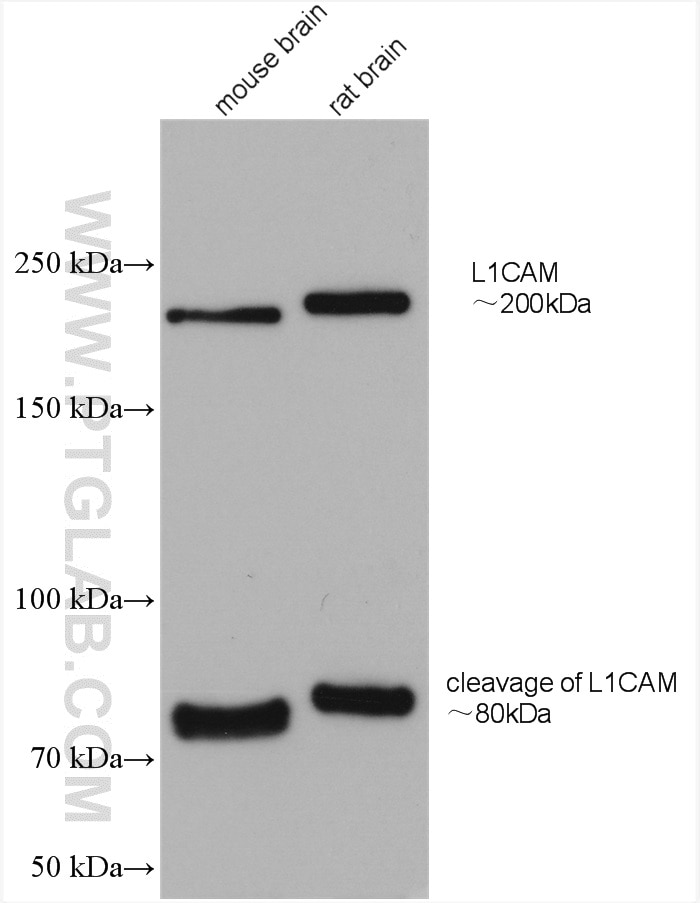Tested Applications
| Positive WB detected in | mouse brain tissue, rat brain tissue |
Recommended dilution
| Application | Dilution |
|---|---|
| Western Blot (WB) | WB : 1:500-1:2000 |
| It is recommended that this reagent should be titrated in each testing system to obtain optimal results. | |
| Sample-dependent, Check data in validation data gallery. | |
Published Applications
| WB | See 5 publications below |
| IHC | See 1 publications below |
Product Information
20659-1-AP targets L1CAM/CD171 in WB, IHC, ELISA applications and shows reactivity with human, mouse, rat samples.
| Tested Reactivity | human, mouse, rat |
| Cited Reactivity | human, mouse, rat |
| Host / Isotype | Rabbit / IgG |
| Class | Polyclonal |
| Type | Antibody |
| Immunogen |
Peptide Predict reactive species |
| Full Name | L1 cell adhesion molecule |
| Calculated Molecular Weight | 140 kDa |
| Observed Molecular Weight | 200-220 kDa, 80 kDa |
| GenBank Accession Number | NM_000425 |
| Gene Symbol | L1CAM |
| Gene ID (NCBI) | 3897 |
| RRID | AB_2878717 |
| Conjugate | Unconjugated |
| Form | Liquid |
| Purification Method | Antigen affinity purification |
| UNIPROT ID | P32004 |
| Storage Buffer | PBS with 0.02% sodium azide and 50% glycerol, pH 7.3. |
| Storage Conditions | Store at -20°C. Stable for one year after shipment. Aliquoting is unnecessary for -20oC storage. 20ul sizes contain 0.1% BSA. |
Background Information
L1CAM, also known as NCAM-L1 or CD171, is a cell adhesion molecule of the immunoglobulin superfamily. It is a 200-220 kDa transmembrane glycoprotein composed of six Ig-like domains and five fibronectin type III repeats followed by a transmembrane region and a highly conserved cytoplasmic tail (PMID: 3412448; 22796939). L1CAM is primarily expressed in the nervous system and is involved in neuron-neuron adhesion, neurite fasciculation, outgrowth of neurites, cerebellar granule cell migration, neurite outgrowth on Schwann cells and interactions among epithelial cells of intestinal crypts (PMID: 3412448; 10767310). L1CAM is overexpressed in many human cancers and is often associated with bad prognosis (PMID: 27267927; 26111503). It has been reported that L1CAM can be proteolytically cleaved into a soluble fragment of 140 kDa and an intracellular fragment of 80-85 kDa (PMID: 30842511; 34380733). This antibody raised against 1206-1221aa of human L1CAM detects 200-220 kDa full-length L1CAM and 80-kDa cleaved fragment of L1CAM.
Protocols
| Product Specific Protocols | |
|---|---|
| WB protocol for L1CAM/CD171 antibody 20659-1-AP | Download protocol |
| Standard Protocols | |
|---|---|
| Click here to view our Standard Protocols |
Publications
| Species | Application | Title |
|---|---|---|
Histopathology Frequent KRAS mutations in oncocytic papillary renal neoplasm with inverted nuclei. | ||
Diagnostics (Basel) Circulatory Astrocyte and Neuronal EVs as Potential Biomarkers of Neurological Dysfunction in HIV-Infected Subjects and Alcohol/Tobacco Users. | ||
Anal Chem Nanosensor-Driven Detection of Neuron-Derived Exosomal Aβ42 with Graphene Electrolyte-Gated Transistor for Alzheimer's Disease Diagnosis | ||
Sci Rep Curcumin enhances elvitegravir concentration and alleviates oxidative stress and inflammatory response | ||
Biomolecules The Upregulation of L1CAM by SVHRSP Mitigates Neuron Damage, Spontaneous Seizures, and Cognitive Dysfunction in a Kainic Acid-Induced Rat Model of Epilepsy | ||
Res Sq Curcumin enhances elvitegravir concentration and alleviates oxidative stress and inflammatory response |




